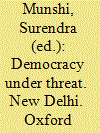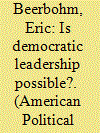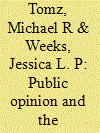| Srl | Item |
| 1 |
ID:
155428


|
|
|
|
|
| Publication |
New Delhi, Oxford University Press, 2017.
|
| Description |
xxviii, 258p.hbk
|
| Standard Number |
9780199484805
|
|
|
|
|
|
|
|
|
|
|
|
Copies: C:1/I:0,R:0,Q:0
Circulation
| Accession# | Call# | Current Location | Status | Policy | Location |
| 059208 | 321.8/MUN 059208 | Main | On Shelf | General | |
|
|
|
|
| 2 |
ID:
143137


|
|
|
|
|
| Summary/Abstract |
Leadership can baffle our ideal of democracy. If representatives track our preferences, actual or ideal, what room is left for them to pushback against a constituency? This has led some political theorists to conclude that the concept of democratic leadership is paradoxical. I challenge this view by constructing a theory that takes shared commitment as its principal ingredient. The Commitment Theory brings out what is morally distinctive about leadership in a representative democracy. In principle, democratic leadership recruits citizens as genuine partners in shared political activity. The account explains why leadership is taken to be a core property of a functioning democracy and, at the same time, a potential threat to the practice. It is then tested against cases of opinion formation, cue-taking, and frame manipulation. I conclude that the theory avoids dual objections: that it either overcounts or undercounts instances of democratic leadership.
|
|
|
|
|
|
|
|
|
|
|
|
|
|
|
|
| 3 |
ID:
127837


|
|
|
|
|
| Publication |
2013.
|
| Summary/Abstract |
One of the most striking findings in political science is the democratic peace: the absence of war between democracies. Some authors attempt to explain this phenomenon by highlighting the role of public opinion. They observe that democratic leaders are beholden to voters and argue that voters oppose war because of its human and financial costs. This logic predicts that democracies should behave peacefully in general, but history shows that democracies avoid war primarily in their relations with other democracies. In this article we investigate not whether democratic publics are averse to war in general, but whether they are especially reluctant to fight other democracies. We embedded experiments in public opinion polls in the United States and the United Kingdom and found that individuals are substantially less supportive of military strikes against democracies than against otherwise identical autocracies. Moreover, our experiments suggest that shared democracy pacifies the public primarily by changing perceptions of threat and morality, not by raising expectations of costs or failure. These findings shed light on a debate of enduring importance to scholars and policy makers.
|
|
|
|
|
|
|
|
|
|
|
|
|
|
|
|